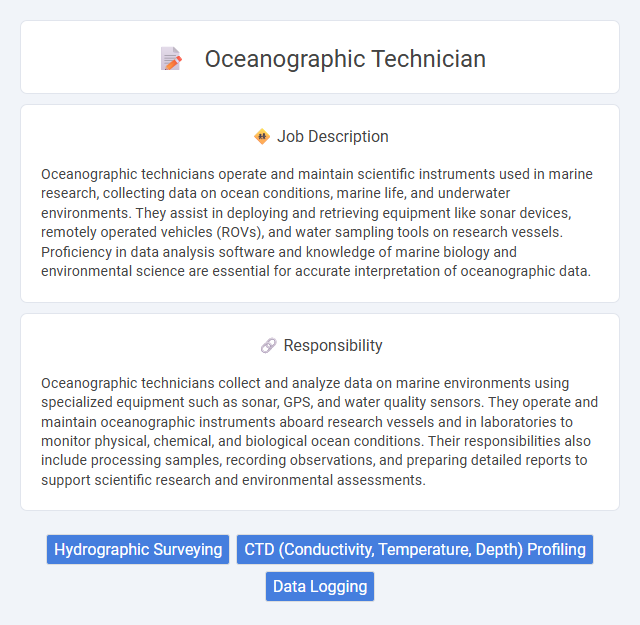
Oceanographic technicians operate and maintain scientific instruments used in marine research, collecting data on ocean conditions, marine life, and underwater environments. They assist in deploying and retrieving equipment like sonar devices, remotely operated vehicles (ROVs), and water sampling tools on research vessels. Proficiency in data analysis software and knowledge of marine biology and environmental science are essential for accurate interpretation of oceanographic data.
People with a strong interest in marine environments and scientific research are likely to find fulfillment as oceanographic technicians. Those who enjoy working outdoors, are comfortable with physical labor, and have good problem-solving skills may be well-suited for this career. Individuals who are adaptable to varying weather conditions and can handle technical equipment might have a higher probability of success in this field.
Qualification
Oceanographic technicians typically require a bachelor's degree in marine science, oceanography, or a related field, combined with hands-on experience in data collection and laboratory techniques. Proficiency in operating specialized oceanographic instruments, conducting field surveys, and analyzing marine data is essential. Certifications in scuba diving or remote sensing technology can enhance job qualifications and career prospects.
Responsibility
Oceanographic technicians collect and analyze data on marine environments using specialized equipment such as sonar, GPS, and water quality sensors. They operate and maintain oceanographic instruments aboard research vessels and in laboratories to monitor physical, chemical, and biological ocean conditions. Their responsibilities also include processing samples, recording observations, and preparing detailed reports to support scientific research and environmental assessments.
Benefit
Oceanographic technicians likely enjoy benefits such as hands-on experience with cutting-edge marine technology and field research, increasing their expertise in marine science. They probably have opportunities to contribute to important environmental monitoring and conservation efforts, which can enhance job satisfaction and career growth. The role may also offer diverse work environments, including laboratories, vessels, and remote field sites, providing varied and engaging professional experiences.
Challenge
Oceanographic technician roles likely involve complex challenges such as operating sophisticated marine instruments and troubleshooting unpredictable equipment failures in harsh ocean environments. Navigating logistical constraints and weather conditions may frequently test problem-solving skills and adaptability. Major challenges probably include ensuring data accuracy and maintaining safety while conducting underwater research.
Career Advancement
Oceanographic technicians gain expertise in data collection, equipment maintenance, and analysis, positioning them for advanced roles such as research scientist or project manager. Mastery of GIS, remote sensing, and underwater robotics enhances opportunities in marine research institutions and governmental agencies. Continuous professional development through certifications and advanced degrees accelerates career growth and leadership prospects in oceanographic studies.
Key Terms
Hydrographic Surveying
Oceanographic technicians specializing in hydrographic surveying utilize advanced sonar equipment and GPS technology to collect precise data on underwater topography and seabed characteristics. They analyze bathymetric data to support marine navigation, coastal engineering, and environmental monitoring projects while ensuring compliance with international maritime standards. Their expertise in geospatial mapping and data processing is crucial for producing accurate nautical charts and conducting oceanographic research.
CTD (Conductivity, Temperature, Depth) Profiling
Oceanographic technicians specializing in CTD profiling operate advanced instruments to measure conductivity, temperature, and depth, crucial for understanding ocean salinity and thermal structure. Their expertise ensures precise data collection for physical oceanography, climate research, and marine ecosystem studies. Proficiency in calibrating and maintaining CTD sensors, alongside data analysis, supports accurate oceanographic model development and environmental monitoring.
Data Logging
Oceanographic technicians play a critical role in data logging by accurately recording and managing oceanographic measurements such as temperature, salinity, and current velocity. They utilize advanced instruments like CTD sensors and remotely operated vehicles (ROVs) to gather precise environmental parameters crucial for marine research. Efficient data logging ensures high-quality datasets that support oceanographic modeling, environmental monitoring, and scientific analysis.
 kuljobs.com
kuljobs.com